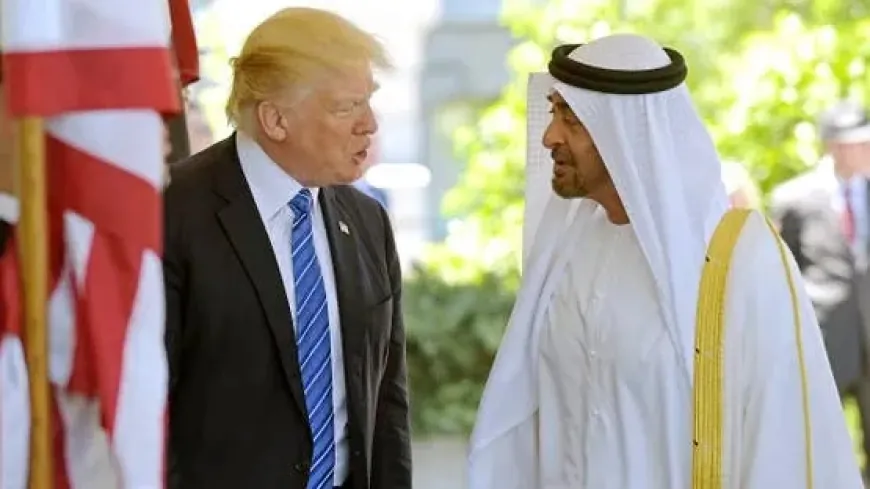Trump Signs €179B UAE Deal: AI Super Hub, 500K Nvidia Chips & Jet Orders
Trump closes €179B deal with UAE—includes world’s largest AI hub, 500K Nvidia chips, Etihad-Boeing jets, and $60B U.S.-UAE oil alliance.

President Donald Trump has concluded a major diplomatic and economic tour through the Gulf region by finalizing €179 billion ($200 billion) worth of agreements with the United Arab Emirates. This marks a significant milestone in U.S.-UAE relations and caps a series of investment pledges from Gulf nations that total more than €1.3 trillion ($1.4 trillion).
The UAE deals, signed in Abu Dhabi, focus on technology, aviation, energy, and critical materials—indicating a shift in economic cooperation between Washington and its regional partners, with less emphasis on oil and more focus on high-growth sectors.
Abu Dhabi Launching Largest AI Hub Outside the U.S.
A key project included in the agreements is the construction of a massive artificial intelligence campus in Abu Dhabi. Covering 10 square miles and equipped with 5 gigawatts of data capacity, the facility will be built by Emirati tech firm G42, working in partnership with major American technology companies.
The site will support high-performance computing for AI applications and is expected to serve both regional and international markets, particularly in developing economies across Africa and South Asia.
U.S. officials confirmed that negotiations are underway to allow the UAE to purchase up to 500,000 Nvidia H100 chips annually through 2027. Of that total, around 20% would go directly to G42’s data operations.
Despite some concerns within U.S. security circles about the risk of sensitive technology reaching rival states, the U.S. Department of Commerce said the deal includes tight controls on access and compliance measures to prevent unauthorized use or transfers.
“The UAE has made specific and enforceable commitments to protect advanced technologies,” said U.S. Secretary of Commerce Howard W. Lutnick. “This is a strategic alignment between two innovation-driven economies.”
UAE President Sheikh Mohamed bin Zayed Al Nahyan, speaking alongside President Trump during the announcement, described the partnership as a model for international cooperation in artificial intelligence.
Etihad Orders Widebody Aircraft in €13 Billion Agreement
The visit also led to significant developments in aviation. Etihad Airways signed a €13.1 billion ($14.5 billion) contract with Boeing and GE Aerospace to acquire 28 new widebody aircraft. The purchase includes Boeing 787 Dreamliners and the next-generation 777X, all powered by GE’s latest jet engines.
This comes just one day after Boeing finalized a €89 billion ($96 billion) order with Qatar Airways. These deals are boosting confidence in the U.S. aerospace sector, with Boeing and GE shares rising following the announcements.
Etihad CEO Antonoaldo Neves said the investment will help the airline improve fleet efficiency and expand long-haul operations. The aircraft will be manufactured in Boeing’s U.S.-based facilities, supporting thousands of American jobs in assembly, engineering, and parts manufacturing.
American Energy Firms Join Forces with ADNOC in €54 Billion Venture
In the energy sector, U.S. oil majors ExxonMobil, Occidental Petroleum, and EOG Resources signed a €54 billion ($60 billion) partnership with the Abu Dhabi National Oil Company (ADNOC). The initiative focuses on expanding oil and gas production, modernizing infrastructure, and investing in lower-emission technologies.
The agreement reflects ADNOC’s plan to raise output capacity while reducing the carbon intensity of its operations. Projects under this partnership are expected to include carbon capture and storage, enhanced oil recovery, and the use of digital systems to optimize field performance.
This cooperation comes amid rising demand for energy security worldwide, especially as many countries seek to balance energy supply with climate commitments.
Investment in Critical Materials for Advanced Manufacturing
In addition to AI and energy, the UAE also signed agreements aimed at boosting its capacity in industrial metals. Emirates Global Aluminum (EGA) will expand its aluminium and gallium production through a new collaboration with U.S. companies.
Gallium is a key material used in semiconductors, solar panels, and high-frequency electronics. With China currently dominating global gallium supply, this project is expected to give the U.S. and its partners a more stable and diversified source.
The expansion will contribute to both countries' goals of building secure and resilient supply chains for critical materials used in defense, clean energy, and digital infrastructure.
Economic Cooperation Shifts Toward High-Tech and Strategic Industry
President Trump’s Gulf tour has resulted in large-scale agreements with Saudi Arabia, Qatar, and the UAE—each focusing on future-oriented sectors rather than traditional commodity trade.
From AI infrastructure and aviation to oil modernization and semiconductor materials, these deals reflect a mutual interest in strengthening industrial capacity and promoting long-term investment. They also support Trump’s domestic agenda to bring more high-value manufacturing and technology partnerships back to the United States.
In total, the tour has delivered a series of major deals that serve both American economic priorities and the Gulf states’ drive to diversify their economies.
The agreements signed in Abu Dhabi reflect a practical move by the U.S. and UAE to build stronger economic ties. Both countries are focused on developing new industries such as artificial intelligence and energy, signaling a shift away from oil dependency toward diversified growth.
Also Read: Saudi Arabia Partners with Nvidia to Build Massive AI Infrastructure as Trump Visits Gulf
































































